Is Facebook Depression A Real Thing And Should We Care?
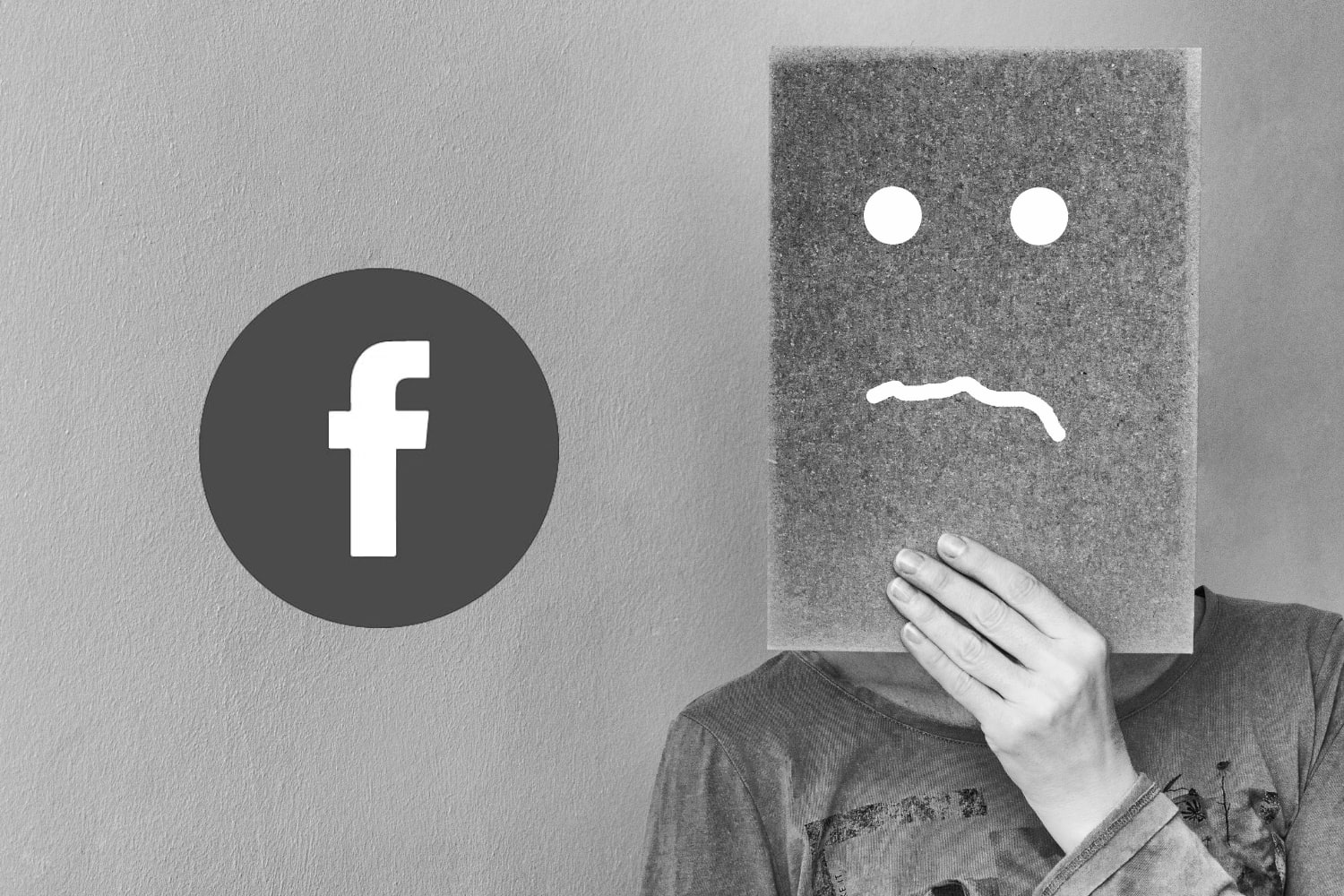
“Is Facebook Depression A Real Thing And Should We Care?”.
I was curious about the relationship between social media platforms, specifically Facebook, and depressiveness. For my literature review assessment for my psychology studies, I set the research question as, “Facebook Effects on Depression in University and College Students”, hoping to find answers to satisfy my curiosity.
In this article, I am sharing my academic research essay and touching on various points of my findings while researching for the assessment. Read the full research essay on google cloud storage.
Facebook and Depression
I was not alone in wondering about the connection between Facebook and depression. There have been emerging studies in exploring the relationship between the two, possibly to see if Facebook usage contributed to depressiveness. If you were like me, a heavy Facebook user, you might have noticed heavy-hearted posts shared and reshared by your friends on Facebook from time to time. Some friends show persistent depressiveness, and sometimes we feel that we could “catch” the dark mood just by reading those posts.
Geographical Bias
My essay used the Australian statistics data as I was attending school in Australia, and the piece would be more relevant in that context. The statistics in 2017 showed that approximately 17 millions of Australians used Facebook, which was about 70% of the Australian population; 1 in 2 users used Facebook daily.
Age Group
My essay observed a specific group which was university and college students. I placed an intent interest in this group as evidence showed that Australian university students displayed a high rate of depressive symptoms and about 13% out of 800 students in the study showed severe to extremely severe depressive symptoms.
Aim Of The Literature Review
The primary goal of the review was to investigate the impacts of Facebook depression risk among university students. I hoped that the literature review would disclose help-seeking behaviours among young Australians, predict depressive symptoms, and help develop effective interventions against depression.
The Literature Review Components
The literature review formed one part of one of the assessments for the module; another part was a community resource. With any academic assessment, there are marking rubric requirements that we have to observe, and the conditions can sometimes limit the depth of the topics.
A literature review consists of a collection of scholarly writings on the research topic. For this specific assessment, there was a focus on the research method, which listed the specifics of the database sources, search results, and strategy to enable replication of the research.
Qualifying Criteria
From the search results, we would do the first round of “shortlisting” by reading the titles of the articles – this is when you will appreciate good titles! I would download the papers and label them in sequencing pretext with the actual title, and prepare a reference summary that would correspond to the saved articles. If you referred to the image of the sample page of my reference summary, you would also see the APA style in-text citation in various format when citing the reference within the essay. Following the in-text citation is the reference citation which I would list at the last page of the report.
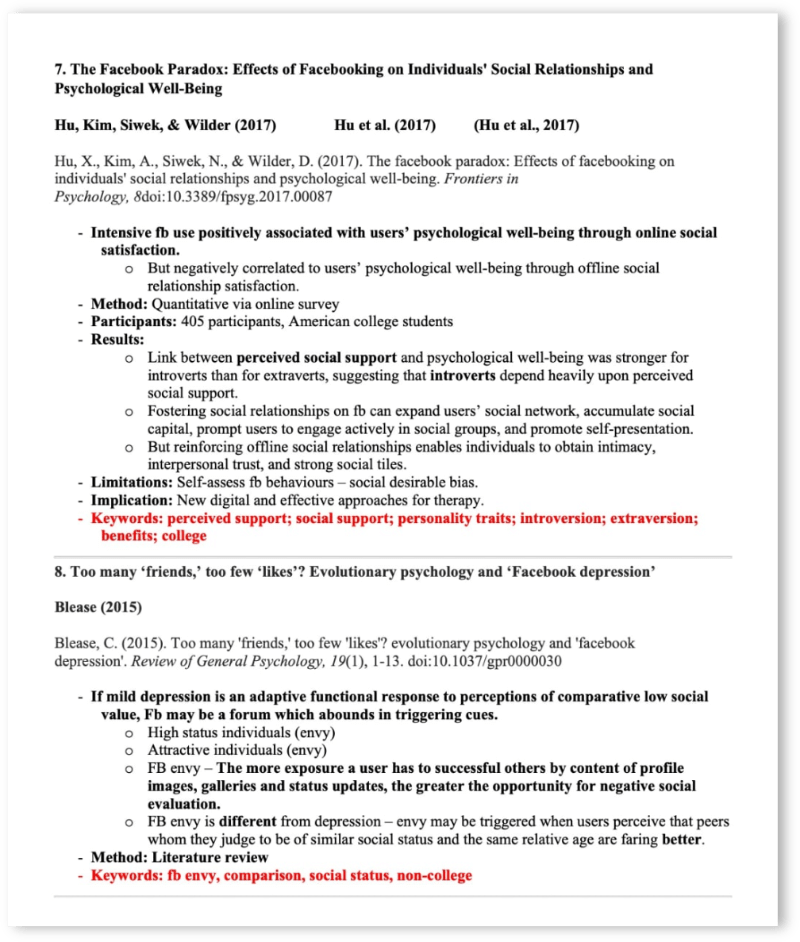
Having the reference summary makes in-text citation easier. I included “keywords” for each article, and usually, the keywords revolved around the developing ideas for the essay while researching.
Types Of Studies
I substantiated my choices for the types of studies – qualitative studies through interviews, and quantitative experimental studies – with the rationale that the review sought to study the affective effects of the individuals. Case studies did not meet the requirement of an adequate sample size to represent the population, so they were excluded.
Outcomes Of The Studies
Now, the results surprised me. Such surprises would not be the first time. I had developed hypotheses for the previous research essays that the findings did not support my views. It is important to note that even when the evidence did not support the theory, the study still served a valuable purpose and sometimes, it is the surprise findings amid the results that shine.
For this particular paper, the studies that I selected for comparison showed no direct association between Facebook use and depression among university and college students. However, I observed the ramifications about other topics. The ramifications were the surprise findings.
Surprises
The communication medium came up during my research, specifically, the preference for electronic communication among people who displayed depressive symptoms. I wrote an article, “Why Do People Love To Communicate Electronically?” on this topic separately on CARA Unmask as it deserves a full report on its own, and also one of the key reasons why I support CARA Unmask as an effective emotional support platform.

Attitudes Of Facebook Users
While there was no direct link between Facebook use and depression, the attitudes and online behaviours of the users may underpin the salient problems presented over the social media platforms. Social envy and social comparison showed up in many of the studies that I was researching, and they formed the attitudes that yielded varying reactions when responding to friends’ photos and posts.
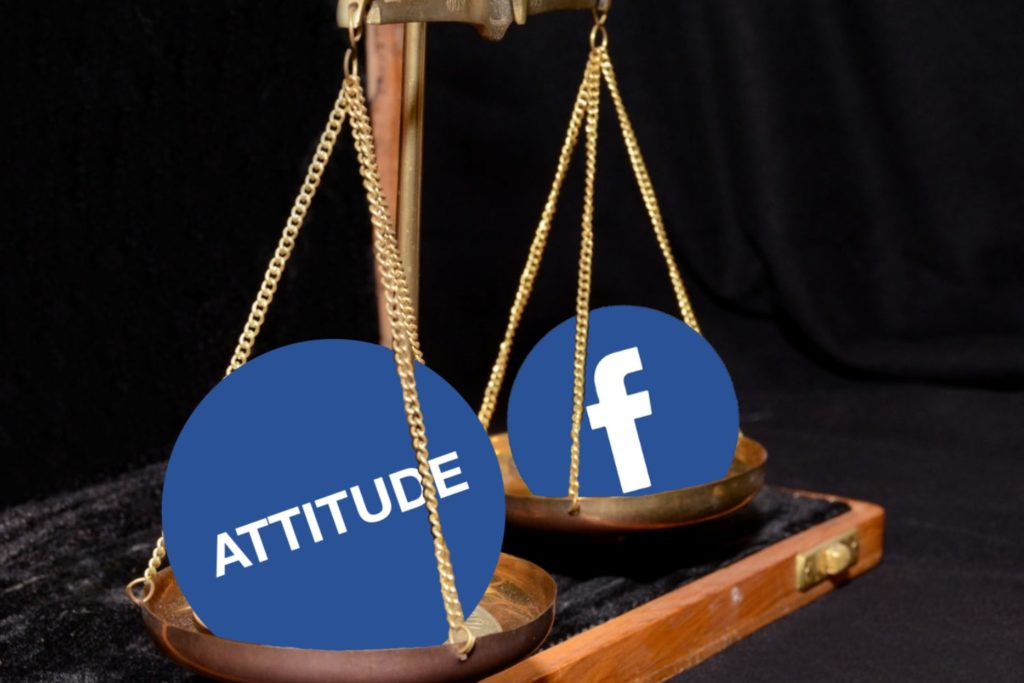 I will also be writing a separate article on the topic of social envy as I firmly believe that it stems to the fundamental trigger of depressiveness.
I will also be writing a separate article on the topic of social envy as I firmly believe that it stems to the fundamental trigger of depressiveness.
Discussion Section
The discussion section took up a considerable part of the paper as that section provided a closing of the article, and the findings that supported or did not support the hypothesis. We could also present the contrasting and agreeing results from the various studies, and illuminate the unexpected discoveries that could explain the existing or another phenomenon within the researched topic. Finally, we make suggestions for interventions, sometimes by consolidating the recommendations from the selected studies that have shown promising outcomes. In this paper, I highlighted the positive results of participants who used online emotional diaries as a form of expressive therapy.
References
I read closely about thirty articles and summarised them in the summary references. Still, as I started writing the literature research, I dropped more than half of them as I found them less relevant. The reference list at the end of the literature review listed fourteen articles which you could try to search for them online or through google scholar. Some pieces are not available without subscription or privilege, but usually the excerpt or executive summary would be available.
Community Resource – Flyer
With the completed literature review, I created a flyer meant for distribution in common places that students frequent. Arguably, I could have done a better job at designing the flyer if not for procrastination that resulted in a tight dateline by the time I got to work on the essay. I am typically a non-procrastinator, except when it comes to academic assessment projects. Given the unique circumstances, I did not have to do group projects; instead, I did tasks that were equivalent to the amount of the workload required from an individual student. I am not complaining about the arrangement as it was a necessary accommodation. I am just stating that group work has its advantages as it provides a feedback system among the teammates and resolves many uncertainties. When working solo, I would avoid social conflicts, but I also lost the feedback support that I could otherwise benefit from being part of a group. I tended to become more mentally exhausted as I would be doing all the work on my own, whereas tasks could be broken into smaller pieces to distribute to teammates in a group.
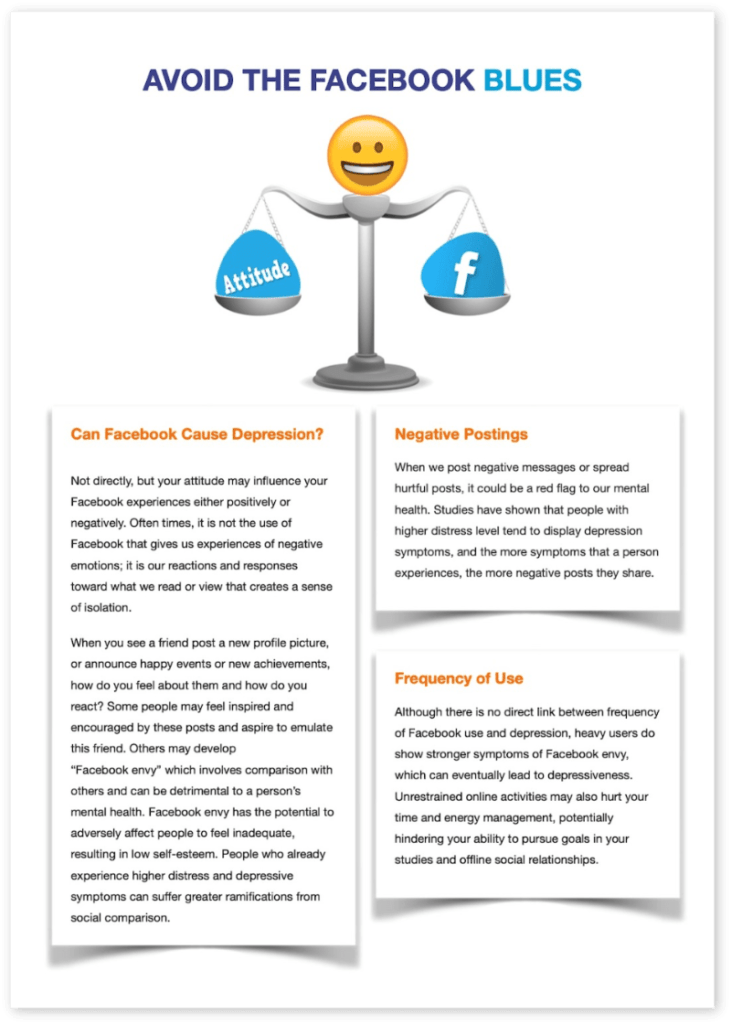
One page of the flyer gives a summary of information on the findings from the literature review with the research question, “Can Facebook Cause Depression?” to catch the attention of potential readers. Another tip is about “Negative Postings” which I am sure we all are guilty of posting at least once during the time we use Facebook. The last snippet highlights the consequences of unrestrained online activities and the development of social envy among heavy Facebook users.
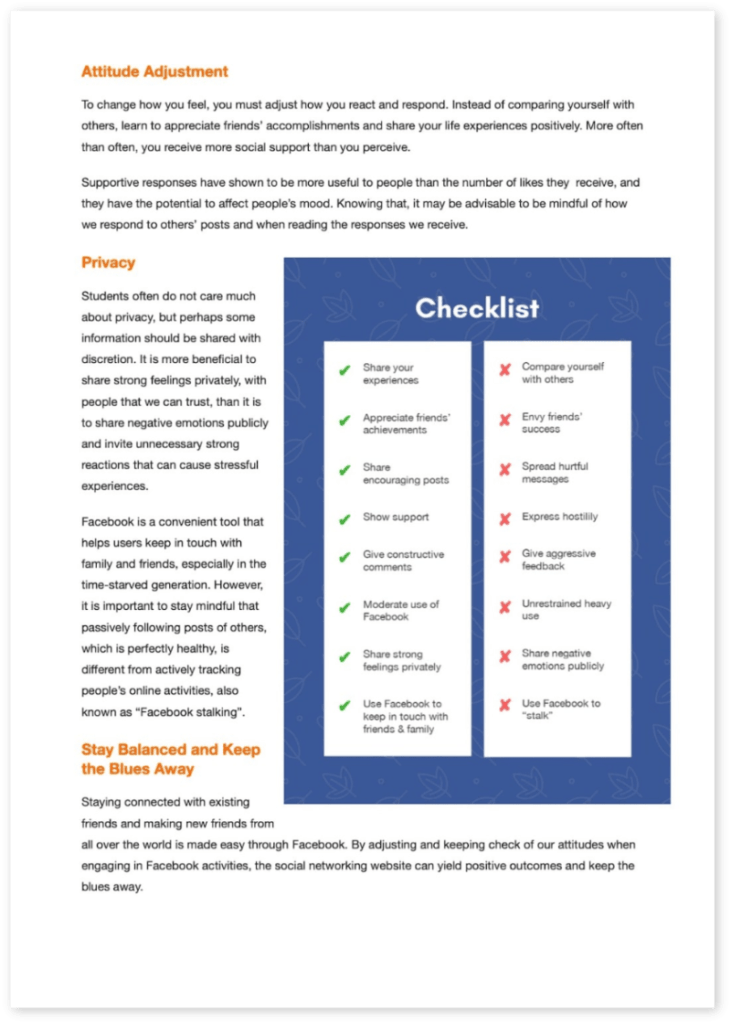
The second page of the flyer provides some advice on healthy use of Facebook, with a checklist of items to avoid some behaviours that could yield a negative outcome. Another column encourages some actions that could result in a good outcome.
Decide On Your Topic
One of the things that I actively considered when doing my psychology studies was to design the research topics around areas of my interests. Some topics matter to me more than the general issues. The concern, however, lies with the controversies of the specific problems that I would raise and argue in my papers. Then, we have to decide if we want to risk tripping on the marker’s bias, predominantly if the marker had expressed a strong opinion opposing our take about the same subject. I have been fortunate to be studying psychology for the sake of learning instead of to achieve academic credentials. Getting great results would be a bonus, but my priority has been to understand the materials but expand the knowledge at my best comprehension and ability.
Disclaimer
This is a reproduction of an academic research essay written in support of the satisfaction of the requirements of an undergraduate degree in psychology. Data and other information contained herein may be derived from class samples and/or assumed numbers and should not be relied upon as the product of original research. The cited references are peer-reviewed research and are offered as general interest suggested reading, but this essay has not been subject to peer review and is not presented as independent and/or authoritative research. This essay does not contain medical advice and should not be used as a substitute for seeking medical attention. If you believe that you are suffering from a mental health condition, please consult a licensed mental health therapist or medical professional. This essay is presented for general intellectual interest only.
- Growing ChatGPT AI Generated Content Everywhere, Should We Be Fearful? - January 14, 2023
- How To Spot A Manipulative Partner Early And Avoid Incompatible Relationships? - January 8, 2023
- Sustaining Admiration Leads to Lasting Love - May 5, 2022

